 Our World
Our World  Our World
Our World  Crime
Crime 10 Dark Details of the “Bodies in the Barrels” Murders
 Animals
Animals The Animal Kingdom’s 10 Greatest Dance Moves
 Movies and TV
Movies and TV 10 Box Office Bombs That We Should Have Predicted in 2025
 History
History 10 Extreme Laws That Tried to Engineer Society
 History
History 10 “Modern” Problems with Surprising Historical Analogs
 Health
Health 10 Everyday Activities That Secretly Alter Consciousness
 History
History Top 10 Historical Disasters Caused by Someone Calling in Sick
 Animals
Animals 10 New Shark Secrets That Recently Dropped
 Movies and TV
Movies and TV 10 Forgotten Realities of Early Live Television Broadcasts
 Our World
Our World 10 Places with Geological Features That Shouldn’t Exist
 Crime
Crime 10 Dark Details of the “Bodies in the Barrels” Murders
 Animals
Animals The Animal Kingdom’s 10 Greatest Dance Moves
Who's Behind Listverse?

Jamie Frater
Head Editor
Jamie founded Listverse due to an insatiable desire to share fascinating, obscure, and bizarre facts. He has been a guest speaker on numerous national radio and television stations and is a five time published author.
More About Us Movies and TV
Movies and TV 10 Box Office Bombs That We Should Have Predicted in 2025
 History
History 10 Extreme Laws That Tried to Engineer Society
 History
History 10 “Modern” Problems with Surprising Historical Analogs
 Health
Health 10 Everyday Activities That Secretly Alter Consciousness
 History
History Top 10 Historical Disasters Caused by Someone Calling in Sick
 Animals
Animals 10 New Shark Secrets That Recently Dropped
 Movies and TV
Movies and TV 10 Forgotten Realities of Early Live Television Broadcasts
10 Fascinating Facts About Rome’s Vestal Virgins
Picture this: It is about 700 years before Jesus was born, and you are Numa. No, not the “Numa Numa” song. You are Numa Pompilius, the king of Rome. You live in a time long before being an insane emperor was cool. The priests of your kingdom have informed you that the goddess Vesta will protect your realm from harm.
The catch? You must light a magical fire in her honor and never let it go out. You wonder: How could the kingdom preserve such a fire? After much thought, you decide that such a task could only be taken on by a holy college of virgin women. This sort of thinking is exactly why they elected you king.
These women were known as the vestal virgins, or the vestals for short. For a thousand years, they attempted to keep Vesta’s sacred fire lit. And because of the 10 reasons listed below, they were perhaps one of the most fascinating orders in all of history.
10 They Had To Remain Chaste But Not Forever
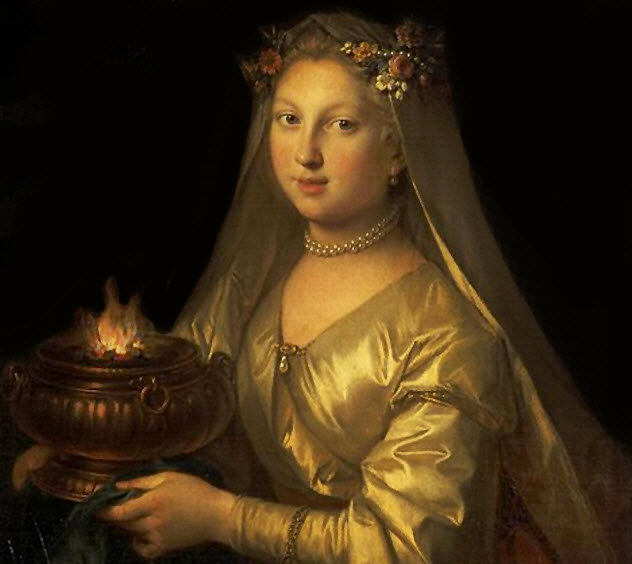
When an order of priestesses is called the vestal virgins, you get the feeling that virginity was an important part of the process. These vestals, who were chosen as children, indeed had to abstain from sex for as long as they tended to the sacred fire.
The holy rites of Vesta could only be performed by somebody innocent and pure of heart. If one of the vestals were to break their vows of virginity, it was feared that the fire would go out and Rome would be destroyed. Therefore, ancient Rome had the greatest argument for chastity in the history of abstinence education.
While some might dread the mere mention of abstinence, not to mention a lifetime of it, fear not. Each vestal only served for 30 years. After their service to Rome had been completed, the priestesses would be freed from their vows, just in time to enjoy their midlife crises but with all of the privileges that were associated with the vestals.
9 They Were The Most Powerful Women In Rome
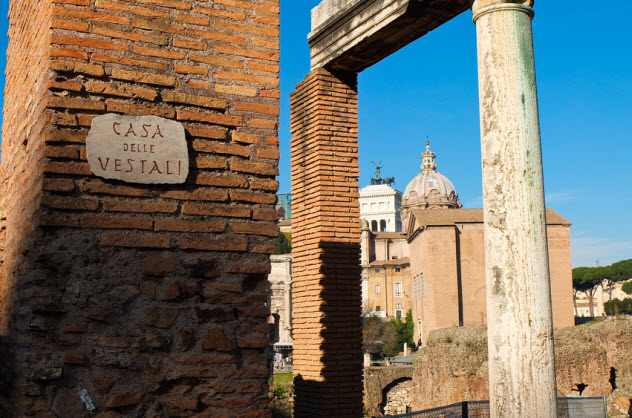
Believe it or not, feminism was not very popular 2,500 years ago. While women in Rome had more rights than women in other ancient cultures, they still could not vote. They were also legally controlled by their fathers and, eventually, their husbands. Because of this, ordinary Roman women rarely owned land or amassed influence.
However, the vestals were no ordinary women. Their rituals were thought to be the one thing stopping Rome from being destroyed or otherwise doomed. Being the most important women in the kingdom/republic/empire, they had privileges that the common women could only dream of.
They were freed from the influence of their fathers and could vote and own property, they were considered trustworthy enough to handle important documents, and they even had front-row seats reserved for them at stadium games. Unfortunately, these privileges have not endured the test of time as modern lady priests are not given complimentary floor tickets to see LeBron play.
8 There Could Only Be Six Of Them (Times Three)

With all the prestige and awe that came with being a virgin, you would think that all the women would have lined up to join the priestesshood. Unfortunately for them, the college of vestals was very exclusive and becoming a virgin was much harder than it would seem. Noble families would offer up their young daughters to the vestal college, although in later years, the college would have to resort to lower-class families as the virginity fad began to die down.
The order would admit six young girls to study the ways of the vestals for 10 years. Afterward, they would perform the rites of Vesta for another 10 years and then train the newest batch of girls for their last 10 years of service. As such, there would never be more than 18 women in the vestals at a time, which made them a rather scarce commodity.
7 Marrying A Former Vestal Was All The Rage
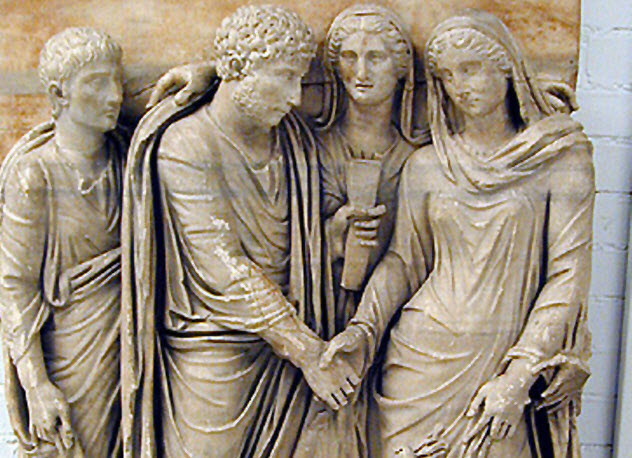
Today, when one thinks of a trophy wife, one thinks about a young woman who has little going for her except for her attractiveness. However, if a man lived in the times of ancient Rome, the greatest wife that he could snag would have been a former vestal. Although they were few in number, retired vestals were well respected, had expanded rights, and received generous pensions, making them potential targets for any masculine gold diggers.
For example, Marcus Licinius Crassus, who is renowned for being one of the wealthiest men in all of human history, is known to have chased the skirt of a vestal named Licinia. He merely wanted to woo her so that he could buy her property cheap.
However, as Licinia was still in the vestal virgins and had not retired yet, a controversy began to brew, and eventually, both Crassus and Licinia were put on trial. Fortunately for the two of them, the judges decided that Crassus was stupidly greedy and didn’t actually mean to deflower the vestal. So Crassus and Licinia were free to go. With this one trial in mind, it would seem that the repercussions for trying to marry a current vestal weren’t too horrible.
6 Marrying A Current Vestal Was A Horrible Mistake
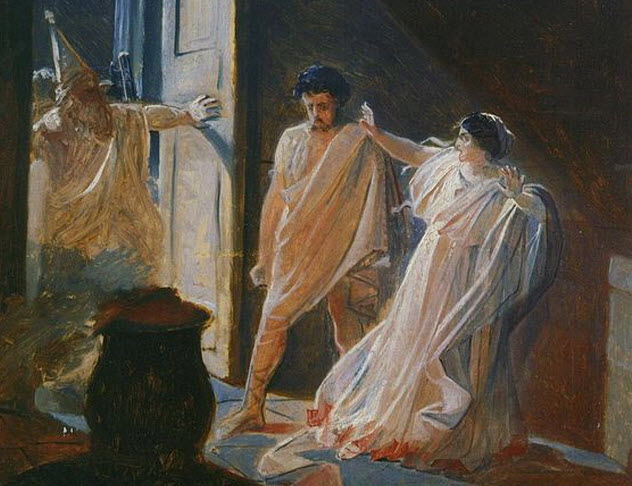
Elagabalus was the 25th emperor of Rome. He was also a teenage boy most famous for fornicating across the capital, marrying five women and two men, and forcing the Senate to watch him dance for his Syrian Sun god—which, in all honesty, is the least that the Senate deserves.
Although Elagabalus preferred the company of his beefy charioteer, he forced Aquilia Severa, a vestal, to marry him. He believed that this would have two benefits: The faiths of Rome and ancient Syria would be joined as one, and he and Aquilia would have “godlike” babies because the vestals were clearly magical.
For the people of Rome, this was unacceptable. The protectors of Vesta’s flames were the vestal virgins, not the vestal babymakers. For the crime of rapturing a vestal away from her duties, among other things, Elagabalus was quickly shown justice. In other terms, he was stabbed and decapitated before being thrown in the Tiber River.
5 Breaking The Rules As A Vestal Was Even Worse
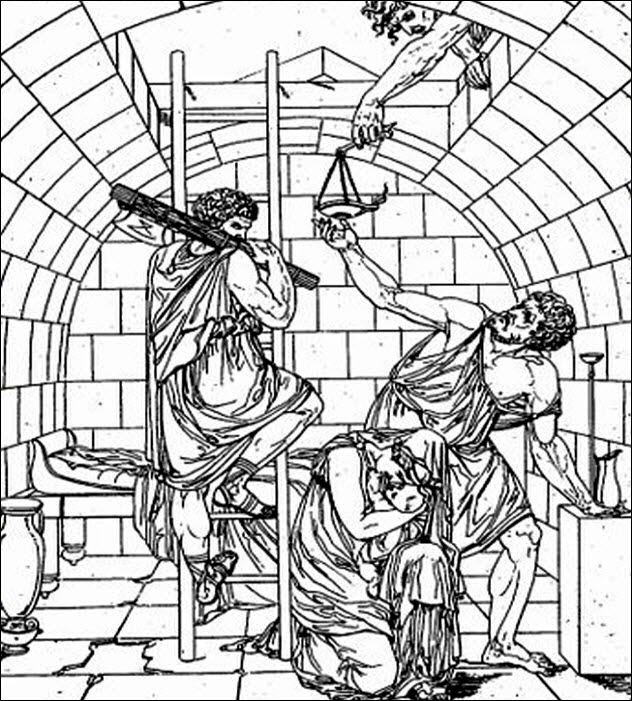
So much emphasis has been placed on the chastity and virtue of the vestals. But even if the Romans thought otherwise, the priestesses were only human. Surely, they erred from their duties on occasion? Everybody needs their fill of Sunday Funday, after all.
Unfortunately, the punishments for errant vestals were ridiculously harsh. If the sacred fire were to go out, then the vestal at fault would be whipped for making the goddess forsake the city. Even worse was the punishment for breaking their vows of celibacy: the considerably bleaker sentence of death.
Of course, attempting to execute a vestal virgin for naughtiness would prove to be difficult as their sacred blood could not be spilled. “Easy solution,” said the other priests. “We’ll just bury them alive!”
This posed another problem, however. Roman law dictated that nobody could be buried within the city. “All right then,” the rival priesthoods collectively murmured. “We’ll build nice rooms underground, put a little bit of food down there, and then seal the room under several feet of dirt. That way, we’re not burying the vestals. We’re just putting them in a chamber where they’ll happen to die after a few days.”
The faithful of Rome then congratulated themselves on the sort of ingenuity that would make any politician swell with pride.
4 They Were Serious About Their Duties
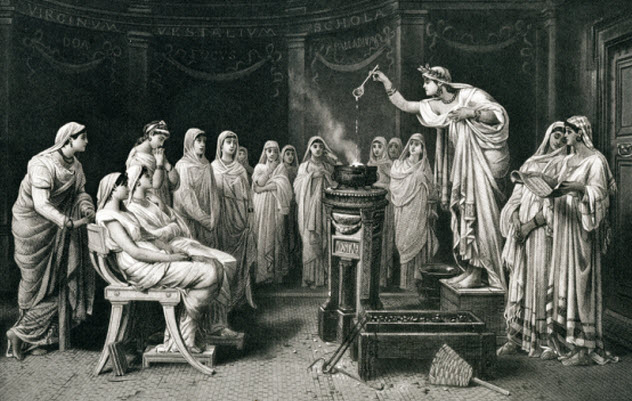
Clearly, being a vestal was not all it was hyped to be, especially if you were constantly under the threat of being whipped, placed in the worst bed-and-breakfast ever, or both. However, to their credit, the vestal virgins were absolutely on top of their game. Vesta’s flame hardly ever went out, although the temple in which it was housed did catch on fire on occasion. That is what you get for trying to keep a magical fire lit for the entirety of Rome’s history.
However, even more incredible is the extent to which the vestals adhered to their vows of chastity. The priestesshood had survived for well over 1,000 years, and yet there are only 10 recorded vestals who were punished for impropriety. That is an average of one virgin breaking the rules every 100 years, a batting average that every religion in the world would be envious of.
3 They Were The Most Sacred And Powerful Of All Roman Clergy
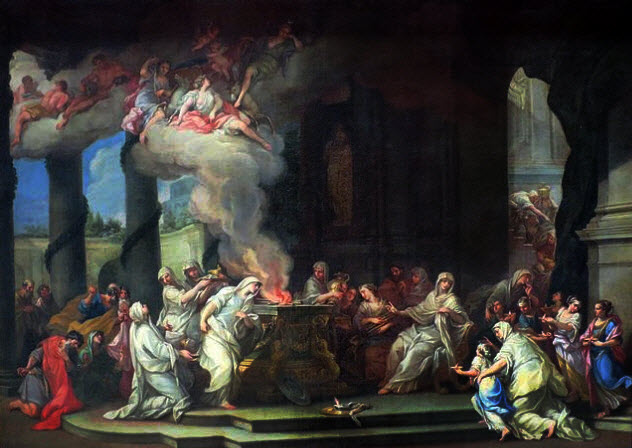
By virtue of protecting the city with Vesta’s flame and having the chastity tenacity of 100 priests, the virgins were naturally the most powerful priestesshood in all of Rome. They even had the political power to pardon pre-dictator Julius Caesar, who had been targeted in one of his rival’s political purges.
Although the priests of other gods had legal protections, the vestals were so revered that merely injuring one was punishable by death—although this presumably did not include dragging one of the errant vestals into an underground chamber.
Furthermore, they were so sacred that they could intervene in criminal affairs at will. If a vestal touched a slave, they were freed on the spot. If a criminal saw a vestal virgin as the criminal was on his way to be executed, he was automatically pardoned. Unfortunately for world history, the demise of Vesta’s college eliminated both the vestals and their slave-freeing powers.
2 Their Fire Was Put Out Forever By The Christians
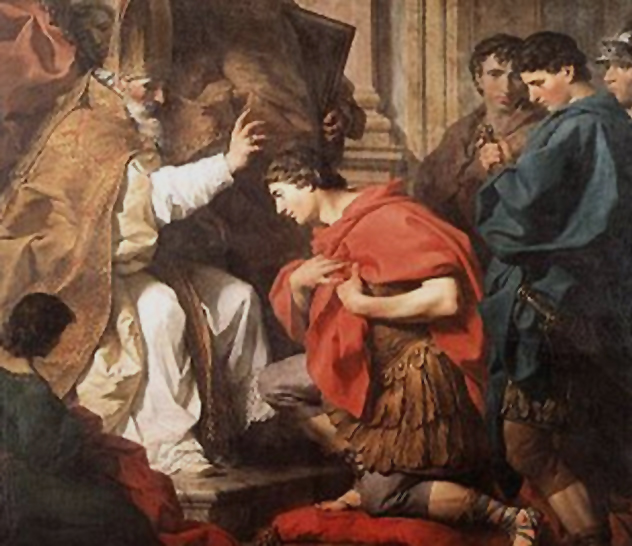
For eons, the vestal virgins had kept the sacred fire in Rome lit like a magical, protection-granting bonfire that only occasionally burned down the surrounding temples. The Roman pagans argued that the fire, coupled with the Romans’ faith in their pantheon, had granted the city the protection of the goddess. This seemed hard to argue with because of the whole 1,000 years of continued existence thing.
Unfortunately for the pagans and the pyromaniacs of Rome, Christianity happened. In the year 394, emperor Theodosius, boasting the most Christian name an emperor could have, closed the vestal college and put out the magical fire.
According to legend, his niece then came to Vesta’s temple and stole a necklace from a statue of the goddess, thinking that nothing bad could come from this. Sixteen years later, Rome was destroyed by rampaging barbarians—to be precise, the dreadful and Hot Topic–dressing Goths—which led to the most scornful “I told you so” in ancient history.
1 The Closing Of The Vestal College Radically Shaped Christianity

Quickly after the sack of Rome, the citizens of the empire were quick to blame the Christians. If the city prospered for a millennium but was destroyed after these religious upstarts had forsaken the old gods, then surely this was all their fault.
However, instead of this leading to sour feelings and a return to paganism, the notion ended up leading to a theological revolution. Saint Augustine, one of the most famous figures in early Christianity, began to work on a rebuttal.
A few years later, he retorted with his most famous work, The City of God, where he argued that the Christian god had protected Rome in the past when it was virtuous and had abandoned the empire for misbehaving in recent times. Vesta and the other pagan gods had failed to protect Rome from past misfortunes.
They were also, he argued, fake and stupid. Although this did little to assuage any former disgruntled vestals, it reaffirmed the beliefs of contemporary Christians and helped cement Augustine as the most important theologian of his time.
Jeremy is an impoverished college student who enjoys research, gaming, history, and researching gaming history.








